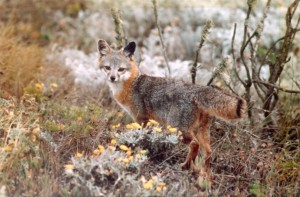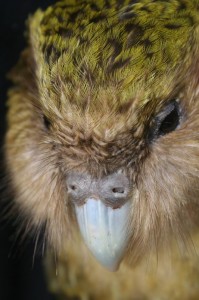I was trying to finish Michael Pollan’s The Omnivore’s Dilemma last night and, while reading the chapter on vegetarianism, I was stopped by a moral question. The set up is based on Pollan’s summary of an ethical argument against eating meat:
- People vary wildly; some are cuter, funnier, smarter, etc.
- Smarter people don’t (as a matter of course) have the right to exploit those not as smart
- Any moral argument for meat-eating that relies on human ‘superiority’ runs in to #2. Any argument that relies on a ‘difference in kind’ is speciesist (which might sound fine now, but might be as hard to justify as racism to your grandkids and their pet space-capybara).
“Okay, great,” say the vegetarians between spoonfuls of granola, “what’s the problem?” Pollan goes on to talk about a population of feral pigs on Santa Cruz Island, whose delectable piglets attracted a now-booming population of golden eagles who waltzed in to the vacuum left by the DDT-extinction of their cousins, the bald eagle. Bald eagles (apparently, I’m going by Pollan here) mostly dine on seafood; golden eagles are huge and scary and dine on land animals like piglets… and the slower, smaller, critically endangered island fox.
Well, the foxes and bald eagles were there first, and the foxes are critically endangered which means, to those not familiar with the IUCN classification, someone will shoot you in the face for sneezing in its direction because it is more important than you. Well they are: there are only 125 Santa Cruz foxes. And that’s why there are snipers hunting down the pigs and trapping the golden eagles – we have lots of pigs.
Sounds reasonable, right? Well, let’s do the same thing with cats. In Last Chance to See, Douglas Adams’ and Mark Carwardine’s travelogue of endangered species, is the story of a program to protect the kakapo. Isolated, New Zealand had lots of bizarre birds happily living on the ground (this being New Zealand, I use the term in a way unfamiliar to Southern Ontarians; there are lots of fjords and sundry cliffs) because there weren’t many other animals there – even the Maori were fairly recent. More recent still were the European sailors, and the animals they brought with them: rats, possums, and, yes, cats, all of whom would quite enjoy a meal of slow, fat bird or its eggs and were quite able to get them. Thus the government of New Zealand, killed off all the rats and possums and cats over a few islands, and brought every kakapo (and other endangered island birds) they could find to live on them.
So that’s Fluffy – is that fine too? If it’s not, is it fine to leave these species to extinction? There aren’t that many of them, and a single pregnant cat and her offspring could probably get to them quite easily. If it is fine, then where do we draw that line? The komodo dragon lives on inhabited islands, and they are not good neighbours.
So here’s the point: if we believe in “animal rights,” do those rights belong to the individual (as do human rights) or the species? The ethical argument for veganism is that the individual animal has a right to live, and live freely. But then the morally consistent stand would be to support the pigs and the cats – Pollan recounts a Save the Pigs campaign which flew plane-trailed banners. On the other hand, domesticated animals only exist because we’ve bred them for captivity over millenia (or have we, as Pollan argues, grown together to a form of mutualism?) and wouldn’t exist otherwise. In fact, as long as they’re treated well, the life of a farm-raised chicken or cow is generally much more pleasant than a life in the wild spent scrounging for food and fearful of… foxes.
Half of Omnivore’s Dilemma is actually devoted to telling the story of just such a farm. On Polyface, it reads at length, cattle, chickens, pigs and grass formed an ecosystem that produced better beef, chicken, eggs, pork, and (via manure) vegetables. Let’s imagine a future where this is the norm – living on abundantly fertile and wide-open Ontario soil, this shouldn’t be hard. If the individual animal has a right to live, and live free, then this is still slavery, albeit a form of slavery some might choose over a cubicle farm, even if it ends in baconizing, as long as it includes a period of stud-ing. The alternative for us though, given the number of human mouths to feed, is a plant-only agriculture that relies on fossil-fuel fertilizers (still much reduced, given everything that goes in to corn and soy for animal feed). Other cities, in hillier climes, would have to continue to rely on intensive planting (and energy-intensive transportation) elsewhere. At our current technology and infrastructure, that’s a recipe for continued (maybe worsening) climate change, condemning huge numbers of species to stress and extinction.
I actually don’t have a dilemma – I’m happy to live in moral inconsistency if it lets me fawn over individual puppies and piglets, express disgust over Chinese supermarket fishtanks, and still choose to eat local fish in the Yukon (there were no local fish, due to overfishing in Alaska, so I enjoyed non-local asparagus parmesan on fettuccine instead). But there’s certainly an inconsistency there, and thus a question: Do animal rights belong to the individual or the species? If the individual, what do we do about re-nativization and sustainable food? If the group, is vegetarianism justifiable? Is liberalism?


Well, given that I’m doing this from a green standpoint rather than a moral one (you know, the one where eating chicken is better than eating beef), I obviously am going to have a different take on this.
However, after talking with Scott about some practices (and reading his extremist vegan cookbooks, and watching certain videos in my PACS courses), I do have some concern for animal rights in the issue. However, I don’t actually object to killing them per se. It’s mistreating them. So, while they belong to the individual, it’s a lot easier to resolve dilemmas like this one for me.
And no, I don’t consider eating meat daily ok, as long as it’s free-range, etc, etc, etc. That level of meat isn’t sustainable with cruelty-free methods. (Then there’s the crazy hippie side of me which cares about food for all humans and stuff like that). By the same token, I’ve never seen a moral advantage to getting rid of meat and replacing it with eggs and milk – not that it’s hypocritical to go vegetarian and not vegan, but that eating large quantities of eggs and milk will result in just as much suffering as eating some meat.
I agree with almost everything you said: the environmental problems with raising all this meat is unconscionable, and the industrial agricultural system is often cruel and certainly unnatural and dehumanizing (deporcinizing/debovinizing?).
But I think there is an ethical problem with eating meat, at least in the liberal tradition. Fundamental to the modern concept of human rights is the belief that those rights are inherent to every human. It’s not that we, as humans, are granting rights to each other because we would rather live in a society (our rights, that is, don’t flow from a social contract). Given that, how can we deny that other animals have similar inherent rights? We could say there’s a difference in kind, but what kind? Not by intelligence; Einstein doesn’t have any ‘greater’ rights than do I. By species? If by that we mean the ability to create genetically viable offspring, are transgendered individuals without the ability to reproduce humans, and have human rights? And if so, what makes us special in a way that we deserve rights that other animals don’t?